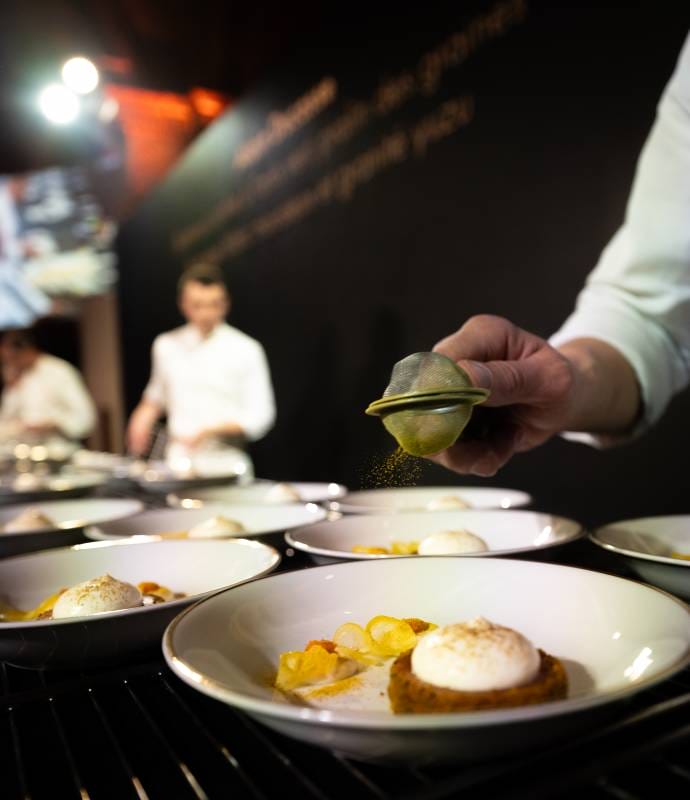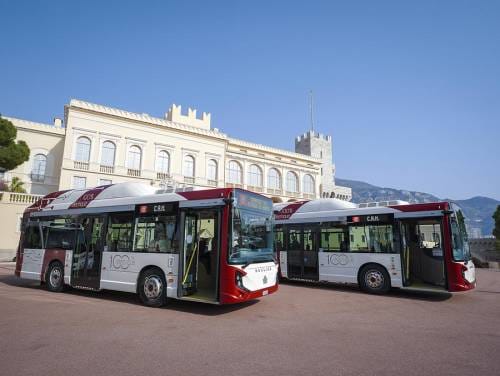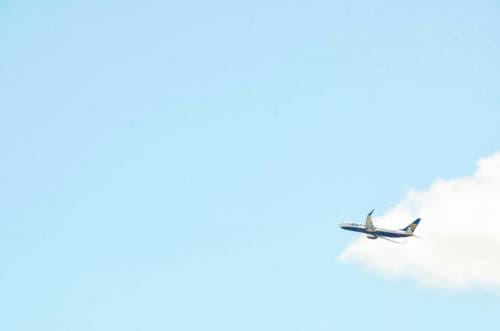March 23, 2017 is a historical date for the Principality. Following successive ratifications from the United Nations Framework Convention on Climate Change in 1994, the Kyoto Protocol in 2006 and more recently the Paris Agreement in 2016, Monaco is plunging into its environmental future with full force. During the presentation of the White Paper* on an energy transition in the Principality on Thursday evening at the Yacht Club, Prince Albert II committed the country to a green revolution. “Irreversible.”“All the decisions we make today are effective in their immediacy and beneficial effects for the future.”The White Paper is the result of months of exchanges between institutions, companies and members of civil society. It is a “very ambitious” objective, summarized by government advisor Marie Pierre Gramaglia, Minister of Infrastructure, Environment and Urban Planning. “A more than 50% reduction in greenhouse gases in 2030 compared to 1990 and carbon neutrality in 2050. These targets imply a rate of reduction of emissions four times faster than what has been observed so far.”
A “challenge,” according to Prince Albert II, who has already created an impressive roadmap for sustainable development! Goals far more ambitious than those granted by the signatories of COP21. Basically, it’s an effort for all, hence the creation of “incentives to lead our country towards decarburization.” A regulatory framework aimed at “encouraging the development of solar panels with the implementation of a solar cadastre before this summer,” “a general prohibition of fuel oil for heating,”“a systemization of intelligent and efficient lighting systems in buildings and outdoor spaces.” A paradigm shift in sustainable development where the motives are not – for once – money, but a shift in individual and collective behavior. It’s a question of education and communication.

The sovereign announced the creation of an information platform linked to the energy transition containing regulations, subsidies and environmentally responsible habits to adopt. As well as “new, large-scale initiatives, such as the creation of a day without cars” and, for the long-term, “banning plastic bags and phasing out plastic bottles.” The Prince then appealed to local entrepreneurs “to contribute to the goals through innovative solutions.” “A new lease of life must be created by a new generation of start-ups. In this process of developing renewable energies, the State will also invest in new enterprises outside the Principality. On our territory, which is a pioneer in seawater heat pumps, programs will be launched such as the extension of the thalasso thermal energy network of Condamine and the creation of a new electrical network at the Larvotto, offering a new renewable energy source.” Finally, the “Prince- ecologist” wants the construction of an “exemplary and energy-positive” public building. The symbolic act of an environmentally friendly trend. “Our entire community must undertake, with courage and determination, a path towards this energy transition. To facilitate its mobilization, I would like to see a commitment to a national pact on an energy transition which combines all the forces of our country.”
The Sovereign’s Objectives:
- Prohibition of fuel oil for heating buildings;
- Updating energy regulations for new and existing buildings;
- Creating a platform for all information related to energy transition (including regulations and subsidies);
- A solar cadastre which will include all potential roofs in Monaco;
- An exemplary energy-positive public construction;
- The end of the plastic bottles;
- Investment in new renewable energy enterprises outside the Principality.

A great discussion
Presented as the “first step in mobilizing the Monegasque community,” the White Paper consisted of gathering grievances and wishes from the local players. Carried out by a dedicated entity (the “Mission for the Energy Transition” with the assistance of EQUINEO Cabinet) this approach met a double requirement according to Marie-Pierre Gramaglia. The energy transition requires a “change in the mode of production of energy on the one hand and a shift in our way of consuming on the other hand.” Between September and December 2016, 59 organizations and nearly 90 people were “auditioned” and five business sectors (tourism, events and leisure, health, energy and urban services, economy, commerce and businesses) met during workshops in January 2017.
“Two ways of seeing things” on the financial side
A broad consultation which allowed everyone to have “a good understanding of the issues and challenges to be met,” according to Marie-Pierre Gramaglia. Jean-Luc Nguyen, head of the mission for energy transition, praised “the richness of trade” and “their frankness,” as well as their “very strong adherence to the objectives set by the Sovereign for 2030 and 2050.”
There was unanimous support for the need to strengthen the dialogue between institutions, businesses and individuals. On the other hand, there were “two ways of seeing things” during the monetary aspect of the discussions. “Some people want the Government to offer financial support, while others believe that private players already have the financial capacity and that there is no need to help them achieve the objectives.” “The discussion will continue because the co-operation of everyone is vital to the success of this project,” said Marie-Pierre Gramaglia, recalling the creation of a national green fund at the request of the Prince, last year, to “endow this ambitious and voluntary project with the financial means necessary to achieve it over the long term.” The Government-Ministerial Advisor concluded: “The actions implemented will not entail our economic development but they will create new opportunities.” Jean-Luc Nguyen welcomes the different perspectives voiced during these talks. “We have seen that there is a lot of good practice in Monaco but that most of it is limited to the organizations that implement them. These discussions led to the desire to pool these initiatives together.”
Monegasque priorities
Each of the participants in the workshops which helped draft the White Book was invited to prioritize the most important themes for the energy transition in Monaco. The headings were: mobility, buildings and waste, followed by the Principality’s energy supply. “It is clear that the issues specific to Monaco are well identified, since the themes mentioned in the first section identify the three main sources of greenhouse gases in the Principality,” stressed the head of the mission for energy transition, Jean-Luc Nguyen. The latter then disclosed – in a non-exhaustive manner – the “problems” and “solutions” to each of these themes according to the participants.
Mobility
x Problems: Accessibility and circulation problems come up “very often”. The issue: “excessive car-use, often by a single person and for a short distance.” “Monaco is fulfilling its offer of too many car parks”. Other negative issues include, the “lack of reliability and quality of the SNCF service” and “the multiplication of construction sites”.

✓ Solutions: More electric bicycle terminals, the development of public transit and “proposing the creation of parking lots at the entrance of Monaco”. The addition of bicycle lanes and dedicated parking spaces, and an increased number of high-speed charging stations for electric vehicles.
Buildings
x Problems: “The environmental and energy performances of buildings are insufficient.” It should be noted that the question of “financing is not a problem for the new ones but rehabilitating current ones may be an issue.” Similarly, “acknowledging the overall cost to the environment is too underdeveloped,” i.e. “taking into account the future expenses of operating a building is rarely integrated into its design.”Finally, energy services are too often limited to maintenance.
✓ Solutions: The creation of a Monegasque “green label”. Carrying out energy performance studies when applying for a building permit. Grants for energy audits for buildings and setting up a consulting system for co-owners.
Waste
x Problems: Lack of information and visibility on the situation. Lack of space for different sorts of bins. Biomass energy for organic material (food waste and greens) to be developed. Too little awareness from the state and, more generally, a lack of a “culture of energy sobriety”.
✓ Solutions: “In order to achieve more virtuous behavior, participants suggest that potential renewable energy (solar, biomass, geothermal, hydrogen, wave energy…) in Monaco be evaluated.” The passage of fuel to other heating sources in buildings is encouraged, as is the optimization of data centers and servers that “consume a lot of electricity but also produce heat”. “They also highlighted the power supply of boats that use fuel to generate electricity.”
*The White Paper is available for download at: www.gouv.mc in the “Publications” section.








